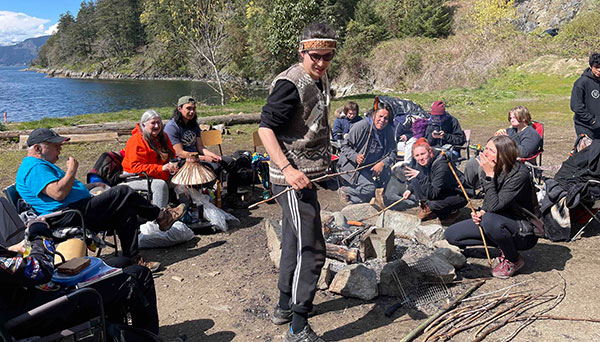Snuw uy ulh tuna tumuhw (Teachings of the Land): Reconnecting Youth with Indigenous Land Stewardship Practices and Traditions
Organization: Stqeeye' Learning Society
The Stqeeye’ Learning Society is committed to the preservation, protection and restoration of the culturally and spiritually important territory of Quw'utsun'. We share our responsibilities to the land, sea, and each other through Indigenous focused, land-based learning experiences for Indigenous and non-Indigenous Youth, families and community members.
Location: Salt Spring Island (Isl.), British Colombia.
Communities directly affected by the project: Salt Spring Isl., Pender Isl., Mayne Isl., Galiano Isl., Saturna Isl., Duncan, Victoria, and other waters and lands in Quw'utsun' Territory.
Country: Canada
Other Organizations Involved: School District 64 (Southern Gulf Islands); School District 79 (Cowichan Valley); Cowichan Tribes; Curriculum writing team: Dr. Collette Jones, Rosanna Jackson, Denise Augustine; Elder and Knowledge Keeper Advisory Committee; Youth Advisory Committee.
 @ Stqeeye' Learning Society
@ Stqeeye' Learning Society
Background
Quw’utsun people have been living on the coastal lands of the Salish Sea in for at least the last 15,000 years. Beginning in the mid-1840s, British Columbian Indigenous people have been forcibly removed and excluded from accessing, harvesting and stewarding the lands and waters.
With the exclusion of our intimate knowledge of the land and waters, the balance between humans and the environment has been upended, contributing to the climate emergency we find ourselves in today. In our teachings, climate change and adaptation are not new concepts, and we are told about catastrophic flows, extreme heat, storms, and how we adapted to and mitigated the changes. The forced removal of our people, combined with colonial agriculture and unsustainable logging practices, have led to the destruction of touchtone cultural species, including Redcedar, Garry Oak and Salmon. This loss severely impacts our people’s ability to practice our culture, stewardship, food security and sovereignty.
Goals
Our goal is to strengthen the climate resiliency of Indigenous youth, their families and communities through the reconnection with the rich cultural knowledge, practices and traditions carried by Quw’utsun Elders and knowledge keepers.
Main activities
- Develop an Indigenous, land-based curriculum;
- Through our Indigenous, land-based education program (Youth on the Land), identify and train a team of youth land and water guardians, who will work with other Quw’utsun communities to identify and lead the restoration of coastal ecosystems; and
- Enhance the community’s ability to take control of food sovereignty and security.
Outcomes
- Pilot Stqeeye’ developed and owned an Indigenous, land-based curriculum that meets the BC Curriculum graduation standards and is usable by educators in British Columbia and adaptable and scalable for other communities;
- Establish an Indigenous team of land and water guardians;
- Increase the number of youth and families engaged in climate resiliency;
- Increase the number of Youth Land Guardians who have been trained in traditional ecological stewardship and restoration;
- Increase number of youth and families participating in traditional and sustainable food harvesting and growing practices on land and sea.
Through partnerships with Cowichan Tribes, School District 64, School District 79, Native Friendship Centres, and Indigenous Land Guardian training, the project will engage Indigenous Elders, youth and community members from Quw’utsun (Cowichan Tribes) and surrounding Indigenous communities.